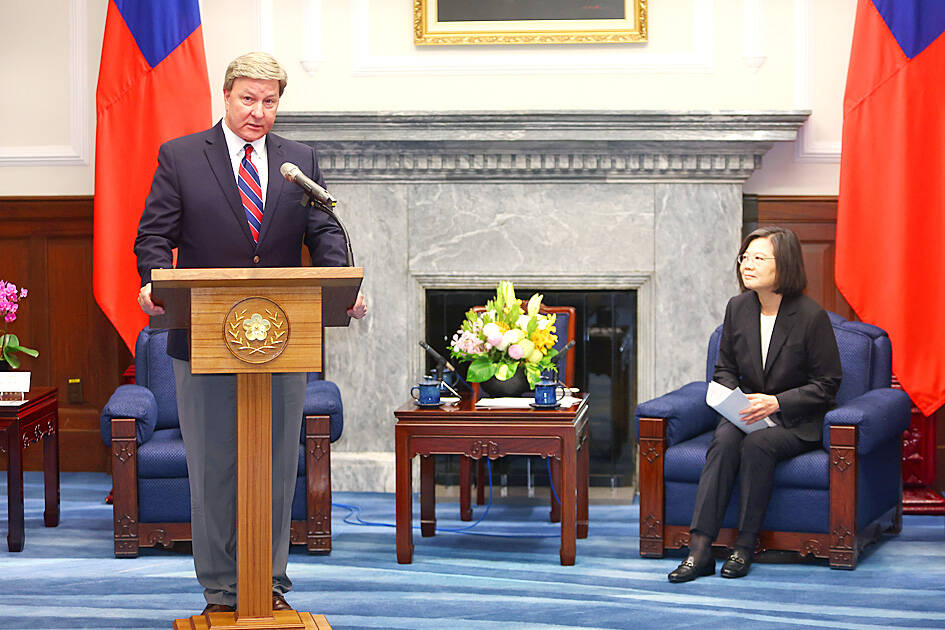President Tsai Ing-wen (蔡英文) yesterday underscored her administration’s intent to cement Taiwan-US relations as she welcomed a delegation of US lawmakers led by US Representative Mike Rogers, chairman of the US House of Representatives Armed Services Committee.
“We thank the US Congress for consistently showing bipartisan concern for Taiwan’s security and its show of support [for the nation] through concrete actions,” Tsai told the delegation at the Presidential Office in Taipei.
The nation expresses gratitude to committee members for their continued efforts to “include policy measures in the annual renewal of the National Defense Authorization Act that enhanced Taiwan’s defensive capabilities,” she said.

Photo: CNA
“Deepening the security cooperation between Taiwan and the US is crucial for maintaining the security of Taiwan and the Indo-Pacific region,” Tsai said.
Members of the committee demonstrated their attentiveness to developments on the international stage and challenges to democracies, she said, adding that the committee has “protected the national security of the US and its democratic allies.”
Tsai also thanked the US Congress for its support in facilitating the signing of the first agreement under the US-Taiwan Initiative on 21st-Century Trade earlier this month, which “marked a new milestone in Taiwan-US trade and economic relations.”
Taipei intends to accelerate its efforts with Washington to create a comprehensive solution to double taxation affecting Taiwanese and US businesspeople to promote economic exchanges between the two countries, she said.
The Presidential Office in a news release cited Rogers as saying that Taiwan and the US share a long and important friendship based on the common values of the rule of law, democracy, and the belief in a free and open Indo-Pacific region.
The bipartisan congressional delegation led by Rogers includes US representatives Adam Smith, Joe Courtney, John Garamendi, Jill Tokuda, David Rouzer, Gary Palmer, James Moylan and Corry Mills.
In other news, Nikki Haley, a former US ambassador to the UN and a Republican presidential hopeful, on Tuesday said that Washington and its allies should “give Taiwan everything it needs to defend itself,” and make clear to Beijing that aggression would mean “a full-blown economic decoupling that would massively damage China.”
Beijing is “an enemy” to the US and “the most dangerous opponent we have faced since World War II,” Haley said in a speech at the American Enterprise Institute in Washington.
“The [Chinese] Communist Party’s endgame is clear. China is preparing its people for war. [Chinese] President Xi [Jinping, 習近平] has openly said it,” she said. “We should take him at his word and act accordingly.”
The US must get Europe to recognize the threat China poses to its security and shake the bloc out of its slumber, Haley said.
Washington should deepen military cooperation with Japan, South Korea, Australia and other partners in the Indo-Pacific region, she said.

DAREDEVIL: Honnold said it had always been a dream of his to climb Taipei 101, while a Netflix producer said the skyscraper was ‘a real icon of this country’ US climber Alex Honnold yesterday took on Taiwan’s tallest building, becoming the first person to scale Taipei 101 without a rope, harness or safety net. Hundreds of spectators gathered at the base of the 101-story skyscraper to watch Honnold, 40, embark on his daredevil feat, which was also broadcast live on Netflix. Dressed in a red T-shirt and yellow custom-made climbing shoes, Honnold swiftly moved up the southeast face of the glass and steel building. At one point, he stepped onto a platform midway up to wave down at fans and onlookers who were taking photos. People watching from inside

A Vietnamese migrant worker yesterday won NT$12 million (US$379,627) on a Lunar New Year scratch card in Kaohsiung as part of Taiwan Lottery Co’s (台灣彩券) “NT$12 Million Grand Fortune” (1200萬大吉利) game. The man was the first top-prize winner of the new game launched on Jan. 6 to mark the Lunar New Year. Three Vietnamese migrant workers visited a Taiwan Lottery shop on Xinyue Street in Kaohsiung’s Gangshan District (崗山), a store representative said. The player bought multiple tickets and, after winning nothing, held the final lottery ticket in one hand and rubbed the store’s statue of the Maitreya Buddha’s belly with the other,

‘COMMITTED TO DETERRENCE’: Washington would stand by its allies, but it can only help as much as countries help themselves, Raymond Greene said The US is committed to deterrence in the first island chain, but it should not bear the burden alone, as “freedom is not free,” American Institute in Taiwan Director Raymond Greene said in a speech at the Institute for National Defense and Security Research’s “Strengthening Resilience: Defense as the Engine of Development” seminar in Taipei yesterday. In the speech, titled “Investing Together and a Secure and Prosperous Future,” Greene highlighted the contributions of US President Donald Trump’s administration to Taiwan’s defense efforts, including the establishment of supply chains for drones and autonomous systems, offers of security assistance and the expansion of

STREAMLINED: The dedicated funding would allow the US to transfer equipment to Taiwan when needed and order upgraded replacements for stockpiles, a source said The US House of Representatives on Thursday passed a defense appropriations bill totaling US$838.7 billion, of which US$1 billion is to be allocated to reinforcing security cooperation with Taiwan and US$150 million to replace defense articles provided to the nation. These are part of the Consolidated Appropriation Act, which the US House yesterday passed with 341 votes in favor and 88 against. The act must be passed by the US Senate before Friday next week to avoid another government shutdown. The US House Committee on Appropriations on Monday unveiled the act, saying that it allocates US$1 billion for the Taiwan Security Cooperation Initiative